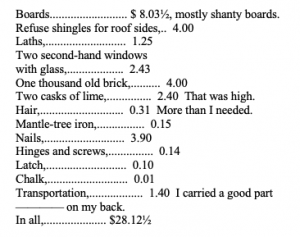The mass of men lead lives of quiet desperation.
I really liked this quote that was found in this chapter of our reading. I understood it to mean that people who live in society blindly live unfulfilling lives. I completely agree with this quote. Which was a first for me since I really despise Thoreau and everything that he writes. If everyone followed what society told them what was right or what was acceptable, nothing would change. There would be no revolutions of any kind, no need for justice and injustice. Things would just be bland and uneventful. Thoreau probably wouldn’t even be a writer that would be read in countless classrooms. Although this seems pretty favorable, under all his pompous words and views, there are some important messages that can be learned. I find this quote to be very moving, inspiring, and interesting to ponder.

